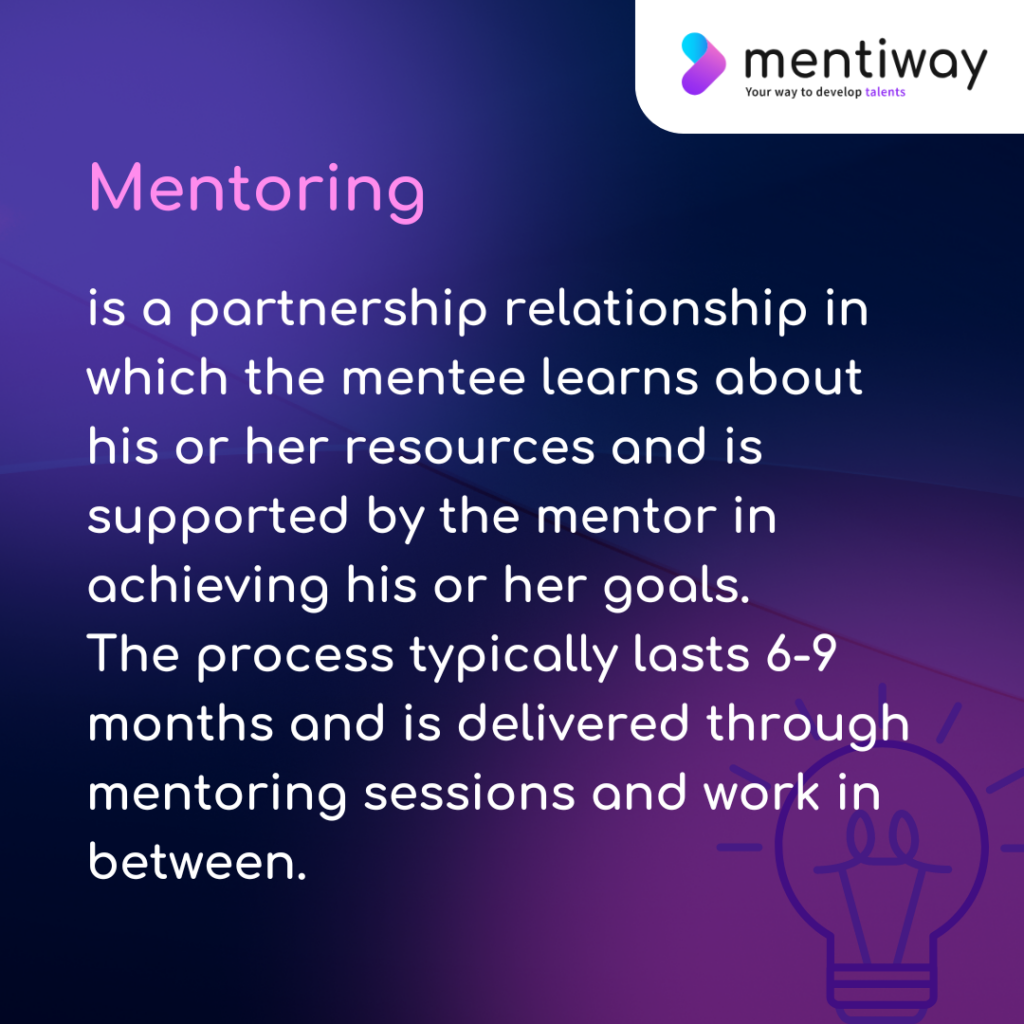Being a mentor – tips & traits of a good mentor
Mentoring in its assumptions is based primarily on the relationship and commitment of the two people in the pair. Each party has its own roles and qualities needed to fulfill them. The Mentee should be committed, open-minded, eager to learn about himself, grow, change his behavior. And the Mentor? Well, that’s what. This is the topic I will address in this article focusing on the traits that a good mentor should have and tips for conducting the perfect mentoring process.
Who is a Mentor – basic definition
We have already written about what mentoring is and who a Mentor is many times on this blog. If you haven’t read it yet, I especially invite you to two texts: what is mentoring and what is the role of a Mentor.
In short, mentoring itself is primarily about active and conscious development of the Mentee, and the role of the Mentor is to accompany this development.

Mentors should participate, or just accompany, in this journey, not lead the Mentee by the hand. The Mentor’s behavior mainly consists of support, attentiveness, listening, asking questions, analyzing, drawing conclusions, giving feedback.
A mentor is also a person who is a specialist in the field being mentored. He or she has knowledge and years of experience, which he or she shares with the Mentee during the process.
So in practice, on the one hand, the Mentor is an expert in his field. On the other hand, he is also a companion, or going further – a Coach – in the development of the Mentee. These two roles ultimately define the qualities and traits that are desirable in a good Mentor / good Mentee.
So what are the qualities of a good Mentor / good Mentee?
Based on the above-mentioned roles, the qualities of a good Mentor can be considered in three areas:
- in terms of domain knowledge and willingness to share it.
- in awareness and coaching workshop,
- and very often in reconciling mentoring with other obligations.
Mentor’s knowledge and experience
This is a key feature in mentoring. A feature that clearly differentiates mentoring from coaching.
First of all, therefore, the Mentor must have advanced knowledge and years of experience in the areas in which the Mentee wants to develop.
But that’s not all.
- A good Mentor must also be open, honest and willing to share this knowledge. Because what good is a Mentee this knowledge if it will be hidden, inaccessible to the Mentee.
- A desirable trait in a Mentor is also motivation coming from helping others and the desire to develop the other party. This definitely helps further supporting the aforementioned sincerity and openness.
- The mentor should also be aware of his/her own strengths and weaknesses in both soft skills and expertise.
- And finally, this knowledge expertise must be organized, thoughtful, not chaotic. Usually these qualities just come with more years of experience in a particular field, but not always. A good Mentor should also pay attention to this.
Coaching and/or leadership workshop
The second area of qualities of a good Mentor touches on this “coaching” part of mentoring. It is about the ability to accompany the Mentee in her development, gently guide and motivate him/her/it to know yourself, set your own goals, plan your development and follow a planned path.
This is the area that differentiates mentoring from training, counseling or tutoring.
First and foremost, the Mentor needs to be aware of what mentoring is and what roles he or she should step into and what roles to avoid.
When he knows this, he should further develop qualities such as:
- The ability to self-evaluate, analyze strengths and weaknesses, set goals for yourself, but most importantly for others.
- Openness, honesty in giving feedback, but also the ability to make feedback less evaluative and more constructive, motivating change.
- Communication, attentiveness, being here and now with the Mentee. Understanding his/her needs, active listening.
- Deepening, scrambling, questioning. Striving to open more thought boxes.
- Familiarity with mentoring or coaching techniques and the willingness and ability to use them. Examples of such techniques include coaching questions, goal-setting techniques, or more advanced tools for creative work, analysis of one’s own thoughts, beliefs, etc..
These qualities are very much in line with coaching, but largely simply apply to leadership or managerial work. A good Mentor is either someone with coaching experience or an experienced leader who has consciously participated in the development of his subordinates.
Time availability and commitment
A good mentor is first and foremost an expert in his field. In order to remain this expert, he must constantly work and gain experience. Therefore, most often Mentors are people whose main occupation is not mentoring, but expert work. For them, mentoring is usually an additional occupation, a desire to pursue other goals, seek new motivations, or simply a conscious broadening of perspective.
In this regard, an important characteristic of a good mentor is the ability to reconcile these two tasks. And this is where we come to:
- Time availability – that is, simply the ability to carve out time for the mentoring process. Mentoring usually lasts several months and involves sessions held at a frequency of every 3-4 weeks. The mentor should therefore assume the need to set aside an average of 2-5 hours per month per process.
- Respect for the other party – here I am referring mainly to the topic of not rescheduling scheduled meetings and preparing for sessions.
- Commitment – full attentiveness during mentoring sessions and paired responsiveness between sessions.
Further development of Mentor
The characteristics outlined above largely exhaust the topic of what a good Mentor should be at the initial stage. Of course, at a later stage of the development of the mentoring workshop, other areas come into play, which result both from the constant acquisition of knowledge about mentoring and the techniques used, as well as from the experience of conducting the processes themselves.
A feature of good advanced mentors with many years of experience is also at least a number of references – feedback from their mentees or earned accreditations (for example, in the EMCC organization).
Good luck!
Hi, my name is Thomas. I am the Co-Founder of Mentiway. We are happy to share our knowledge and support organisations on their way to success! 💪 If you are interested in how to efficiently and effectively implement a mentoring programme in your organisation using technology:








